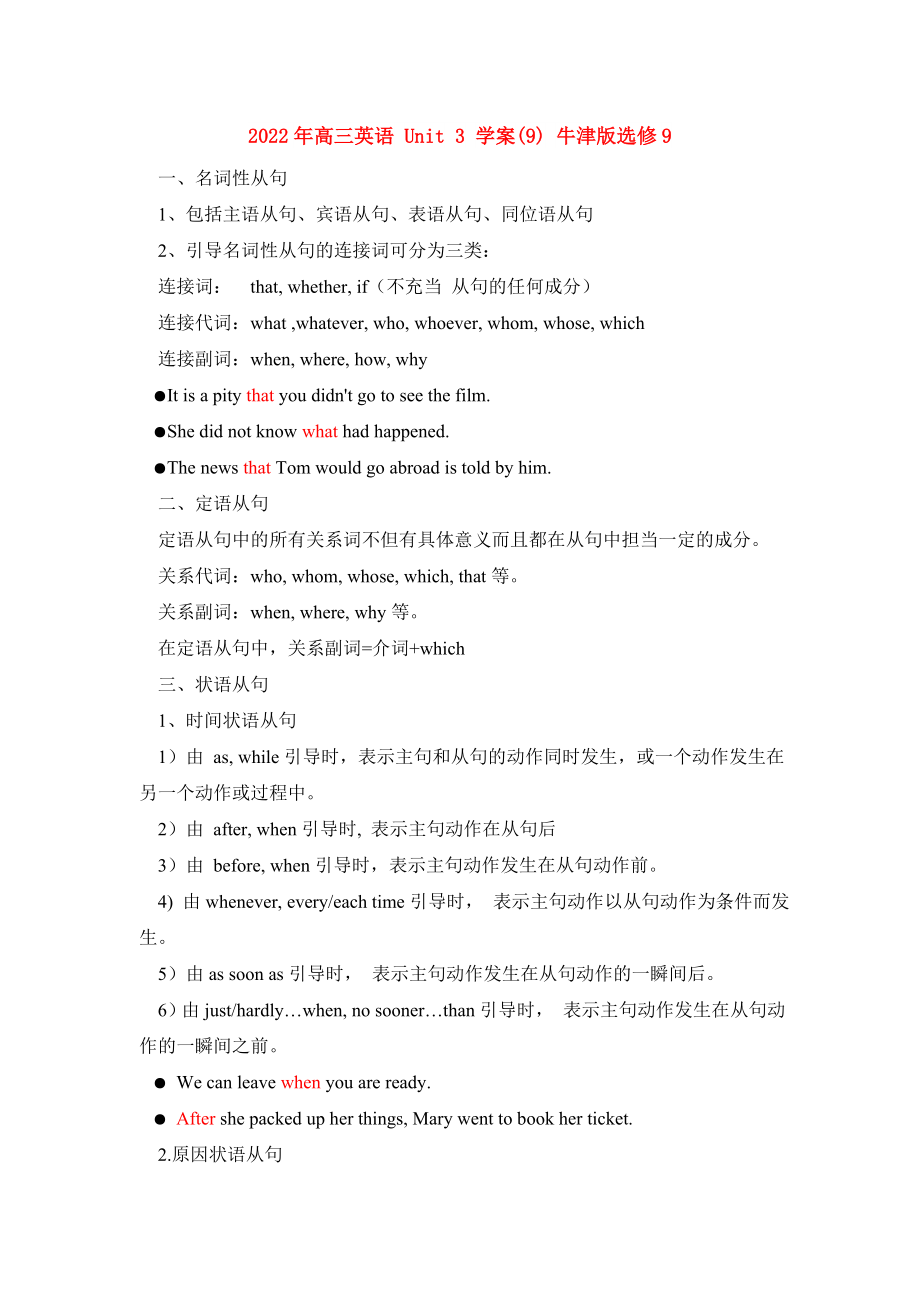《2022年高三英語(yǔ) Unit 3 學(xué)案(9) 牛津版選修9》由會(huì)員分享��,可在線(xiàn)閱讀��,更多相關(guān)《2022年高三英語(yǔ) Unit 3 學(xué)案(9) 牛津版選修9(3頁(yè)珍藏版)》請(qǐng)?jiān)谘b配圖網(wǎng)上搜索��。
1��、2022年高三英語(yǔ) Unit 3 學(xué)案(9) 牛津版選修9
一��、名詞性從句
1��、包括主語(yǔ)從句��、賓語(yǔ)從句��、表語(yǔ)從句��、同位語(yǔ)從句
2��、引導(dǎo)名詞性從句的連接詞可分為三類(lèi):
連接詞: that, whether, if(不充當(dāng) 從句的任何成分)
連接代詞:what ,whatever, who, whoever, whom, whose, which
連接副詞:when, where, how, why
●It is a pity that you didn't go to see the film.
●She did not know what had happened.
●Th
2��、e news that Tom would go abroad is told by him.
二��、定語(yǔ)從句
定語(yǔ)從句中的所有關(guān)系詞不但有具體意義而且都在從句中擔(dān)當(dāng)一定的成分��。
關(guān)系代詞:who, whom, whose, which, that等��。
關(guān)系副詞:when, where, why等��。
在定語(yǔ)從句中��,關(guān)系副詞=介詞+which
三��、狀語(yǔ)從句
1��、時(shí)間狀語(yǔ)從句
1)由 as, while引導(dǎo)時(shí)��,表示主句和從句的動(dòng)作同時(shí)發(fā)生��,或一個(gè)動(dòng)作發(fā)生在另一個(gè)動(dòng)作或過(guò)程中��。
2)由 after, when引導(dǎo)時(shí), 表示主句動(dòng)作在從句后
3)由 before, when引導(dǎo)時(shí)��,表
3��、示主句動(dòng)作發(fā)生在從句動(dòng)作前��。
4) 由whenever, every/each time引導(dǎo)時(shí)��, 表示主句動(dòng)作以從句動(dòng)作為條件而發(fā)生��。
5)由as soon as引導(dǎo)時(shí)��, 表示主句動(dòng)作發(fā)生在從句動(dòng)作的一瞬間后��。
6)由just/hardly…when, no sooner…than引導(dǎo)時(shí)��, 表示主句動(dòng)作發(fā)生在從句動(dòng)作的一瞬間之前��。
● We can leave when you are ready.
● After she packed up her things, Mary went to book her ticket.
2.原因狀語(yǔ)從句
由 because, as, si
4��、nce或復(fù)合連詞now that, in that 等引導(dǎo)
3. 地點(diǎn)狀語(yǔ)從句:由where, wherever引導(dǎo)��。
4.條件狀語(yǔ)從句
由 if, as (so) long as, unless 引導(dǎo)��。
5. 目的狀語(yǔ)從句
由 so that, in order that, in case等引導(dǎo)��。
六��、 結(jié)果狀語(yǔ)從句
由 so that, so …that, such …that 引導(dǎo)��。
七��、讓步狀語(yǔ)從句
由 though, even though, however, no matter how/what/who等引導(dǎo)��。
八��、比較狀語(yǔ)從句
由 than, the mo
5��、re…the more, as…as引導(dǎo)��。
九、方式狀語(yǔ)從句
由in the same way, as 等引導(dǎo)��。
●As the sun rose the fog dispersed.
●Whenever she had a cold, she ate only fruit.
●Now that we have decorated the house, we can move in.
●The thread breaks where it is weakest.
●Robbie didn’t feel as she did.
●She ought to e down just
6��、in case anything happened.
●If necessary, ring me at home.
3) Idioms often use a number of words to represent a single object, person or concept, among other things, and unless you recognize when an idiom is being used, you can easily misunderstand what you read or hear spoken.
The sentence is a
7��、 plex-pound sentence. This happens when coordination(并列關(guān)系) and subordination(從屬關(guān)系) occur in the same sentence. In pound sentences, there are two or more clauses. They are usually linked by coordinators such as and, or and but. Each clause can stand on its own.
●e.g. People who follow this religion
8��、study Buddhist sutras and they follow the teachings of Buddha.
2. Summary
the simple sentence
subject + predicate
the pound sentence
subject + predicate +and/or/but+ subject + predicate
the plex sentence
main clause + subordinate clause
the plex- pound sentence
the simple sentence+ and/or/
9��、but+ the plex sentence
3. Notes: The purpose of analyzing sentences
★ This will help students better understand the meaning of a long and plicated sentence, thus, they will read articles faster and understand them better as well as learn to use plicated sentences to express their views .
★ Use the knowledge to solve the problems correctly.
 2022年高三英語(yǔ) Unit 3 學(xué)案(9) 牛津版選修9
2022年高三英語(yǔ) Unit 3 學(xué)案(9) 牛津版選修9

